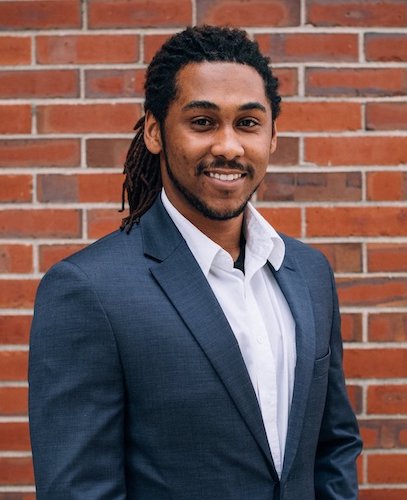Perfect pairings
Philosophy, computer science honors grad sets sights on IBM career

“I think the day I got an offer from IBM, I also got an invitation to interview at Google, but I turned them down,” recent Florida State University graduate Randy Bruno-Piverger said, with a soft laugh of disbelief."
In August, Bruno-Piverger began his new job as a software engineer for IBM. Earlier that same month, he graduated from FSU with two degrees — and honors — in philosophy and computer science. And while he describes himself as “lucky” for landing the job before graduation, it’s clear that Bruno-Piverger’s decision to pursue dual degrees gave him an edge.
Crossing disciplines
“I knew I wanted to at least attempt a double major,” he said. “As I became more involved with computer science, I realized that to be competitive in both fields post-graduation, I would need a thorough education in both areas and decided to complete the full degrees simultaneously.”
Students don’t always recognize the connection between the schools of the humanities, philosophy for example, and the sciences that sprang forth as a result of such philosophical cogitation. Initially, the two camps appear polar opposites, but in reality, philosophy is at the core of the conceptualization of many scientific principles.
It’s no coincidence that scores of great minds throughout history — Descartes, Galileo, Newton, Einstein and more — are credited as both philosophers and scientists. Bruno-Piverger said his two different degree paths actually overlapped and complemented one another.
“Computer science is the study of machines and software at the low and high level. Our ma- chines and software are driven by logic. At the low level, a CPU contains the building blocks of a logical argument: ‘If’, ‘then’, ‘or’, ‘not’,” he said.
“Within the CPU, logical arguments are replicated using nanoscopic wiring, allowing programmers to build machines capable of logic-based computation and general problem-solving. These same logic operators are the elements of one of philosophy’s most basic tools, the syllogism, or an argument that employs deductive reasoning to arrive at a conclusion.”
A different way of thinking
Bruno-Piverger’s former professors at FSU said his ability to see the bigger picture, and the harmony between fields of study, is an impressive quality.
David A. Gaitros, a teaching professor in the Department of Computer Science, described his student as an interesting person who possesses the ability and high level of intelligence to examine the philosophical and practical side of virtually any subject.
Associate professor of philosophy Simon May echoed the sentiment.
“Randy’s honors thesis discusses what would be required for artificial beings to have moral status, that is, for it to matter morally what happens to an artificial being just because of how that being’s existence is affected. Answering this question requires not only knowledge of technical advances and possibilities, but a great deal of moral insight and imagination.”
Commitment and challenge
Bruno-Piverger encourages other students to considering pursing dual degrees, but cautions those inclined toward such a path that the decision should not be made lightly.
“One question worth considering after this determination is how much time are you willing to sacrifice to complete your undergraduate studies,” Bruno-Piverger said. “I graduated well behind my high school peers. Life isn’t a race, but personal and career opportunity is an ever-changing element of achievement, and by choosing to give time to a dual-degree program you invariably lose the chance to pursue other opportunities. These opportunity costs should be included in your considerations, as well.”
Learning beyond the classroom
Bruno-Piverger also worked as a research programmer at the FSU Center for Ocean-Atmospheric Prediction Studies, contributing to such projects as the Shipboard Automated Meteorological and Oceanographic System Initiative and the International Comprehensive Ocean-Atmosphere Data Set.
His primary responsibilities involved writing software to collect, organize, and represent data from the National Oceanic and Atmospheric Administration for more efficient use by meteorologists. His work allowed for environmental differences to be incorporated in collection methods, thereby creating a more accurate dataset for weather forecasting.
Balancing work and studies, although some- times challenging, provided Bruno-Piverger with academic support and a highly-enriching work experience. The people, he added, were the most valuable resource at COAPS.
“You’re making a lot of connections, you’re learning about how to work with others, how to be responsible as a developer. Those are things that a class might not teach you,” Bruno-Piverger said.
“Life isn’t a race, but personal and career opportunity is an ever-changing element of achievement.”
— Randy Bruno-Piverger
